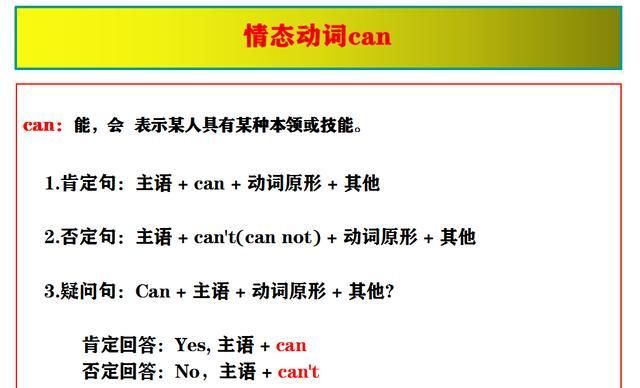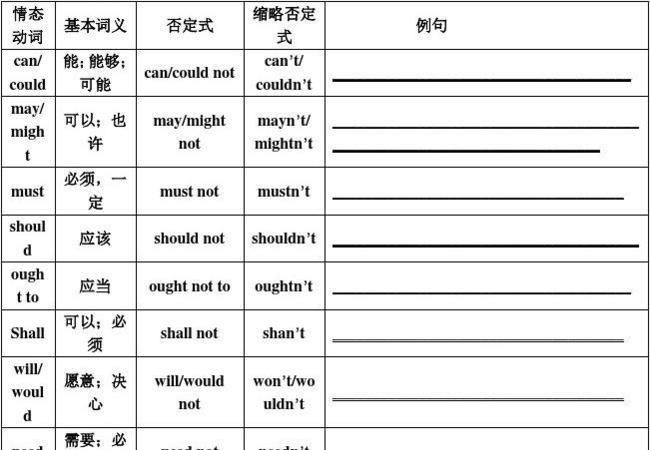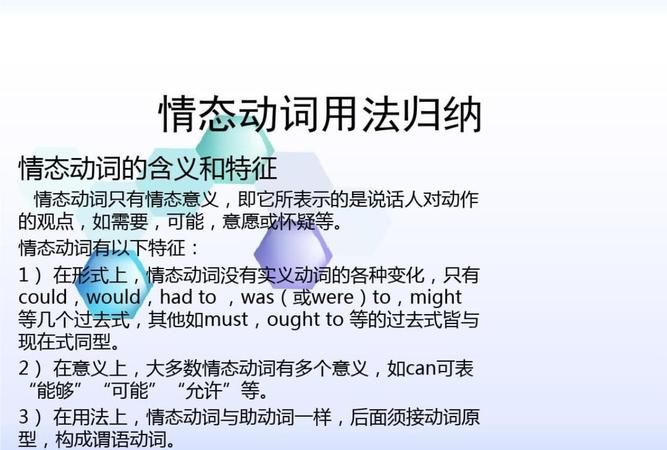本文目录
情态动词是不是动词?
情态动词不是动词,它是助动词的一种,我们可以叫情态助动词,情态动词表达的是语气。因为can是助动词,后面一定接动词原形can do,而can是情态动词,也就是语气助动词。
情态动词 can的用法。这里呢在具体说can这个单词之前,我想先把情态动词的概念说一下,情态动词到底是什么?这里我想告诉大家,情态动词根本就不是动词,它是助动词的一种所以我们可以呢换一个名字叫情态助动词。
那到底为什么叫情态呢?这个两个字啊也不好理解。这里我说一下,情态这里其实它的意思是语气,也就是语气助动词是更好的名称。那情态动词表达的是语气,比如说我们有一个情态动词很常见,叫should你应该做某事,you should do that。这就叫强硬的语气。
再比如说 would you go with me?试探性的问,唉你可以跟我一起走吗?would you go with me?这个时候呢特别害怕别人说啊我不跟你走。would you go with me,这就是一种试探性的语气。
再比如说 could you speak English?这个could you就比这个can you要更加的礼貌,所以同样有一个礼貌的语气。再比如说它还有虚拟语气在里面,比如说I could have been a better student,could have done这里的could就表达的是一种虚拟语气,我本来就可以成为一个更好的学生,这里用的是could。好,总结一下情态动词表语气,它并不是动词,它是助动词,一定要用在动词之前协助着一起成为谓语。它更好的名称呢叫做语气助动词。这就好理解了。又表语气又是助动词,所以情态动词呢更好的说法叫语气助动词。
那接下来,我们重点看一下can到底怎么理解。can呢表示能够嘛,那一定是接动词,因为can是助动词,刚才讲了那一定是接动词,can do一定是动词原形。因为这里涉及到一个助动词的规则,就是但凡出现助动词的话,我任何变形式都变的是助动词,不能再变动词,那这个时候谓语动词就只能用动词原形。
can do something。我能够做某事。那如果说I can swim这个我能够游泳,它表达的是什么样的语气呢?告诉大家表示自信的语气,因为我能够做什么什么事情表达我的能力,这就是一种自信,这种自信的语气展现出来,那就是 I can do something,我能够做某事。can后面一定接动词原形can do,而can是情态动词。也就是说语气助动词。

如何理解英语中的情态动词形式
情态动词是表达语气的单词,表达说话人的一种情绪。观点和可能性。给英语增添了一丝色彩,是必不可少的。

英语情态动词都有哪些?
情态动词的定义:
情态动词是一种本身有一定的词义,表示说话人的情绪,态度或语气的动词,但不能单独作谓语, 只能和其他动词原形构成谓语。
We can be there on time tomorrow.
我们明天能按时去那儿。
May I have your name?
我能知道你的名字吗?
Shall we begin now?
我们现在就开始吗?
You must obey the school rules.
你必须遵守校规。
情态动词数量不多,但用途广泛,主要有下列:
can (could), may (might), must, need, ought to, dare (dared), shall (should), will (would) .
情态动词的位置:
情态动词在句中放在谓语动词之前, 谓语动词前若有助动词,则在助动词之前,疑问句中, 情态动词则在主语之前。
I can see you. Come here.
我能看见你,过来吧。
He must have been away.
他一定走了。
What can I do for you?
你要什么?
How dare you treat us like that!
你怎能那样对待我们!
情态动词的特点:
情态动词无人称和数的变化, 情态动词后面跟的动词需用原形,否定式构成是在情态动词后面加 "not"。 个别情态动词有现在式和过去式两种形式, 过去式用来表达更加客气, 委婉的语气, 时态性不强, 可用于过去,现在或将来。
He could be here soon.
他很快就来。
We can't carry the heavy box.
我们搬不动那箱子。
I'm sorry I can't help you.
对不起,我帮不上你。
情态动词的用法:
can (could) 表示说话人能,可以,同意,准许,以及
客观条件许可,could 为 can 的过去式。
Can you pass me the books?
你能给我递一下书吗 ?
Could you help me, please?
请问,你能帮助我吗?
What can you do?
你能干点什么呢?
Can you be sure?
你有把握吗?
can 和could 只能用于现在式和过去式两种时态,将来时态用 be able to 来表示。
He could help us at all.
他完全可以帮助我们。
With the teacher's help,I shall be able to speak English correctly.
由于老师的帮助,我将能准确地讲英语。
may (might) 可以, 表示说话人同意,许可或请求对方许可。
You may take the book home.
你可以把书带回家去.
May I come in?
我可以进来吗?
May I use your dictionary?
我可以用你的词典吗?
You may put on more clothes.
你可以多穿点衣服.
He said he might lend us some money.
他说他可以借给我们一些钱。
may 否定式为 may not, 缩写形式是 mayn't.
might 是may 的过去式, 有两种用法, 一种表示过去式,一种表示虚拟语气, 使语气更加委婉, 客气或对可能性的怀疑。
He told me he might be here on time.
他说他能按时间来。
Might I borrow some money now.
我可以借点钱吗?
He might be alive.
他可能还活着。
Must 必须,应该,一定,准是, 表示说话人认为有必要做某事, 命令, 要求别人做某事以及对事物的推测。
must 用来指一般现在时和一般将来时, 过去式可用 have to 的过去式代替。
I must finish my work today.
我今天必须完成我的工作。
You mustn't work all the time.
你不能老是工作。
Must I return the book tomorrow?
我必须明天还书吗?
After such a long walk, you must be tired.
走了这么长的路,你一定困了。
He must be the man I am looking for.
他一定是我要找的人。
He had to go because of somebody's calling
him that day.
那天他要走是因为有人叫他。
must + have + 过去分词,表示现在对过去事物的推测。
He must have told my parents about it.
他一定把这件事情告诉我父母亲了。
He must have received my letter now.
他现在一定收到我的信了。
It's six o'clock already, we must have been late again.
已经六点钟了,我们一定又迟到了。
must 和 have to 的区别: must 表示说话人的主观思想, have to 表示客观需要。
You must do it now.
你必需现在就干。(说话人认为必须现在干)
I have to go now.
我得走了。(客观条件必须现在走)
need 需要 多用在否定式或疑问句中.
Need I attend the meeting tomorrow?
我需要明天参加会议吗?
You need not hand in the paper this week.
这一周你不必交论文。
need 是一个情态动词, 他的用法完全和其他情态动词一样, 但 need 还可当作实义动词使用, 这时 need 就象其他动词一样,有第三人称,单复数, 后面加带 to 的动词等特性。
I need a bike to go to school.
我上学需要一辆自行车。
Do you need a dictionary?
你需要词典吗?
She needs a necklace.
她需要一条项链。
needn't + have + 过去分词 表示过去做了没必要做的事情。
You needn't have taken it seriously.
这件事情你不必太认真。
dare 敢 多用在否定或疑问句中。
The little girl dare not speak in public.
小女孩不敢在公众面前说话。
Dare you catch the little cat?
你敢抓小猫吗?
dare 除用作情态动词外,更多的是当实义动词使用, 用法同实义动词一样,要考虑人称,单复数,时态等。
Do you dare to walk in the dark?
你敢黑夜走路吗?
He doesn't dare to tell the teacher what happened that day.
他不敢告诉老师那天发生的事。
ought 应当,应该 后面跟带有 to 的动词不定式。
You ought to read these books if you want to know how to repair the motorcar.
如果你想知道如何修理汽车,你应该读这些书。
You ought to bring the child here.
你应该把孩子带来。
ought + to have done 句型。指过去动作,表示一件事情该做而未做。
You ought to have been here yesterday.
你昨天就应该来。
ought not to have done 句型。表示一件不该做的事情却做了。
You ought not to have taken the book out of the reading-room.
你不应该把书带出阅览室。
will (would)决心,愿望。 would 为 will 的过去式,
可用于各人称。
I'll do my best to catch up with them.
我要尽全力赶上他们。
I'll never do it again, that's the last time.
我再不会做那件事情了,这是最后一次。
He said he would help me.
他说他会帮助我。
will, would用于疑问句表示说话人向对方提出请求或询问,用 would 比 will 更婉转,客气。
It's hot. Will you open the windows?
天气太热了,你能打开窗户吗?
Will you help me to work it out?
你能帮我解这道题吗?
Would you like some coffee?
给你来点咖啡怎样?
Shall, should表示命令,警告,允诺,征求,劝告,建议惊奇。
You should hand in the exercise book.
你应该交作业本儿了。
This should be no problem.
这应该没问题。
Shall we go now.
我们现在可以走了吗?
Why should I meet him?
为什么我要见他?
have to,不得不,必须,表示客观条件只能如此, 而must 则表示主观思想必须。
I have to go now.
我现在得走了。
I have to cook for my child.
我得给孩子做饭。
You must be here on time next time.
你下次一定要按时来。
We must go to get the timetable ourselves.
我们一定要自己去拿时刻表。
情态动词的语法特征:1) 情态动词不能表示正在发生或已经发生的事情,只表示期待或估计某事的发生;2) 情态动词 除ought 和have 外,后面只能接不带to 的不定式。3) 情态动词没有人称,数的变化,即情态动词第三人称单数不加-s。4) 情态动词没有非谓语形式,即没有不定式,分词,等形式。
一、 比较can 和be able to
1)can could 表示能力;可能 (过去时用could),
只用于现在式和过去式(could)。be able to可以用于各种时态。
They will be able to tell you the news soon. 他很快就能告诉你消息了。
2)只用be able to
a. 位于助动词后。
b. 情态动词后。
c. 表示过去某时刻动作时。
d. 用于句首表示条件。
e. 表示成功地做了某事时,只能用was/were able to, 不能用could。
He was able to flee Europe before the war broke out.
= He managed to flee Europe before the war broke out.
注意:could不表示时态
1)提出委婉的请求,(注意在回答中不可用could)。
—— Could I have the television on?
—— Yes, you can. / No, you can't.
2)在否定,疑问句中表示推测或怀疑。
He couldn't be a bad man.
他不大可能是坏人。
二、比较may和might
1) 表示允许或请求;表示没有把握的推测;may 放在句首,表示祝愿。
May God bless you!
He might be at home.
注意: might 表示推测时,不表示时态。只是可能性比may 小。
2) 成语: may/might as well,后面接不带to 的不定式,意为"不妨"。
If that is the case, we may as well try.
典型例题
Peter ___come with us tonight, but he isn't very sure yet.
A. must B. may C. can D. will
答案B. 表可能性只能用may. 此句意可从后半句推出。
三、比较have to和must
1) 两词都是'必须’的意思,have to 表示客观的需要, must 表示说话人主观上的看法,既主观上的必要。
My brother was very ill, so I had to call the doctor in the middle of the night. 我弟弟病得很厉害,我只得半夜里把医生请来。(客观上需要做这件事)
He said that they must work hard. 他说他们必须努力工作。(主观上要做这件事)
2) have to有人称、数、时态的变化,而must只有一种形式。但must 可用于间接引语中表示过去的必要或义务。
He had to look after his sister yesterday.
3) 在否定结构中: don't have to 表示"不必"
mustn't 表示"禁止",
You don't have to tell him about it. 你不一定要把此事告诉他。
You mustn't tell him about it. 你一定不要把这件事告诉他。
四、must表示推测
1) must用在肯定句中表示较有把握的推测,意为"一定"。
2) must表对现在的状态或现在正发生的事情的推测时, must 后面通常接系动词be 的原形或行为动词的进行式。
You have worked hard all day.You must be tired. 你辛苦干一整天,一定累了。(对现在情况的推测判断)
He must be working in his office. 他一定在办公室工作呢。
比较:
He must be staying there.
他现在肯定呆在那里。
He must stay there.
他必须呆在那。
3) must 表示对已发生的事情的推测时,must 要接完成式。
I didn't hear the phone. I must have been asleep. 我刚才没有听到电话,我想必是睡着了。
4) must表示对过去某时正发生的事情的推测,must 后面要接不定式的完成进行式。
——Why didn't you answer my phone call?
——Well, I must have been sleeping, so I didn't hear it.
5) 否定推测用 can't。
If Tom didn't leave here until five o’clock, he can't be home yet. 如果汤姆五点才离开这儿,他此时一定还未到家。
五、表示推测的用法
can, could, may, might, must 皆可表示推测,其用法如下:
1)情态动词+动词原形。
表示对现在或将来的情况的推测,此时动词通常为系动词。
I don't know where she is, she may be in Wuhan.
2)情态动词+动词现在进行时。
表示对现在或将来正在进行的情况进行推测。
At this moment, our teacher must be correcting our exam papers.
这时,我们老师想必在批改试卷。
3)情态动词+动词完成时。
表示对过去情况的推测。
We would have finished this work by the end of next December.
明年十二月底前我们很可能已完成这项工作了。
The road is wet. It must have rained last night.
地是湿的,昨天晚上一定下雨了。
4)情态动词+动词的现在完成进行时。
表示对过去正在发生事情的推测。
Your mother must have been looking for you.
你妈妈一定一直在找你。
5)推测的否定形式,疑问形式用can't, couldn’t表示。
Mike can't have found his car, for he came to work by bus this morning.
迈克一定还没有找回他的车,因为早上他是坐公共汽车来上班的。
注意:could, might表示推测时不表示时态,其推测的程度不如 can, may。
六、情态动词+ have +过去分词
1) may(might) have + done sth, can (could) have + done sth 表示过去,推测过去时间里可能发生的事情。
Philip may (might) have been hurt seriously in the car accident.
Philip can (could) have been hurt seriously in the car accident.
2) must have +done sth,对过去时间里可能发生的事情的推测,语气较强,具有"肯定","谅必"的意思。
—— Linda has gone to work, but her bicycle is still here.
——She must have gone by bus.
3) ought to have done sth, should have done sth
本应该做某事,而事实上并没有做。否定句表示"不该做某事而做了"。
You ought to (should) have been more careful in this experiment.
He ought not to have thrown the old clothes away.(事实上已扔了。)
ought to 在语气上比should 要强。
4) needn't have done sth 本没必要做某事
I dressed very warmly for the trip, but I needn't have done so. The weather was hot.
5) would like to have done sth 本打算做某事
I would like to have read the article, but I was very busy then.
七、should 和ought to
should 和ought to 都为"应该"的意思,可用于各种人称。
——Ought he to go?
——Yes. I think he ought to.
表示要求,命令时,语气由 should(应该)、had better最好)、must(必须)渐强。
八、 had better表示"最好"
had better 相当于一个助动词,它只有一种形式,它后面要跟动词原形。
had better do sth
had better not do sth
It is pretty cold. You'd better put on my coat.
She'd better not play with the dog.
had better have done sth表示与事实相反的结果,意为"本来最好"。
You had better have come earlier.
九、 would rather表示"宁愿"
would rather do
would rather not do
would rather… than… 宁愿……而不愿。
还有would sooner, had rather, had sooner都表示"宁愿"、"宁可"的意思。
If I have a choice, I had sooner not continue my studies at this school.
I would rather stay here than go home. = I would stay here rather than go home.
典型例题
---- Shall we go skating or stay at home?
----Which ___ do?
A. do you rather B. would you rather C. will you rather D. should you rather
答案B。本题考查情态动词rather的用法,would rather +do sth 意为"宁愿",本题为疑问句, would 提前,所以选B。
十、 will和would
注意:
1)would like; Would like to do = want to 想要,为固定搭配。
Would you like to go with me?
2)Will you…? Would you like…? 表示肯定含义的请求劝说时,疑问句中一般用some, 而不是any。
Would you like some cake?
3)否定结构中用will,一般不用would, won't you是一种委婉语气。
Won't you sit down?
十一、 情态动词的回答方式
问句 肯定回答 否定回答
Need you…? Yes, I must. No,I needn't
Must you…? /don't have to.
典型例题
1)——Could I borrow your dictionary?
——Yes, of course, you____.
A. might B. will C. can D. should
答案C.could表示委婉的语气,并不为时态。答语中of course,表示肯定的语气,允许某人做某事时,用can和 may来表达,不能用could或might。复习: will 与you连用,用来提出要求或下命令。should与you 连用,用来提出劝告。
2)——Shall I tell John about it?
——No, you ___. I've told him already.
A. needn't B. wouldn’t C. mustn't D. shouldn’t
答案A。needn't 不必,不用。 wouldn’t 将不, 不会的。 mustn't 禁止、不能。 shouldn’t 不应该。本题为不需要,不必的意思,应用needn't。
3)——Don't forget to come to my birthday party tomorrow.
——______.
A. I don't B. I won’t C. I can't D. I haven’t
答案B. will既可当作情态动词,表请求、建议、也可作为实义动词表"意愿、意志、决心",本题表示决心,选B。
十二、 带to 的情态动词
带to 的情态动词有四个:ought to, have to, used to, be to, 如加上have got to ,(=must), be able to,为六个。它们的疑问,否定形式应予以注意:
Do they have to pay their bill before the end of the month?
She didn't use to play tennis before she was fourteen.
You ought not to have told her all about it.
Ought he to see a heart specialist at once.?
ought to 本身作为情态动词使用。其他的词作为实义动词使用,变疑问,否定时,须有do 等助动词协助。 典型例题
Tom ought not to ___ me your secret, but he meant no harm.
A.have told B.tell C.be telling D. having told
答案A。由于后句为过去时,告诉秘密的动作又发生在其前因,此地应用过去完成时,但它在情态动词 ought to 后,所以用 have。
十三、比较need和dare
这两词既可做实义动词用,又可做情态动词用。作为情态动词,两者都只能用于疑问句,否定句和条件句。 need 作实义动词时后面的不定式必须带to,而dare作实义动词用时, 后面的to 时常可以被省略。
1) 实义动词: need (需要, 要求)
need + n. / to do sth
2) 情态动词: need,只用原形need后加do,否定形式为need not。
Need you go yet?
Yes, I must. / No, I needn't.
3) need 的被动含义:need, want, require, worth(形容词)后面接doing也可以表示被动:
need doing = need to be done

英语情态动词有哪些?
第六章 情态动词
一.概念:
情态动词是表示能力,义务,必须,猜测等说话人的语气或情态的动词.
二.相关知识点精讲:
1.can
1)表能力
can表能力时意味着凭体力或脑力或技术等可以无甚阻力地去做某事。
I can climb this pole. 我能爬这根杆子。
He is only four , but he can read. 他只有4岁,但已认得字了。
Fire can’t destroy gold. 火烧不毁金子。
因为can不能和其他助动词连用,所以表示将来式时用will be able to
You will be able to skate after you have practiced it two or three times.
你练习两三次后就会溜冰了。
2)表可能性
多用于否定与疑问结构中,但也可用在肯定句中。
Can the news be true? 这消息可能是真的吗?
It can’t be true. 它不可能是真的。
What can he possibly mean? 他可能是什么意思?
can 用在肯定句中表示理论上的可能性(一时的可能)。
A horse in the center of London can cost a lot of money.
Attending the ball can be very exciting.
The road can be blocked. 这条路可能会不通的。
may 在肯定句中表示现实的可能性。
The road may be blocked. 这条路可能不通了。
3)表示允许(和may意思相近)常见于口语。
Can (May) I come in ? 我能进来吗?
Can I smoke here ? 我可以在这里抽烟吗?
2.could的用法
1)表过去的可能和许可,(多用于间接引语中)
At that time we thought the story could not be true.
那时我们认为所说的事不可能是真的。
Father said I could swim in the river.
爸爸说我可以在河里游泳。
2)表过去的能力
I could swim when I was only six.
我刚六岁就能游泳。
Could在肯定句中表示过去的能力时,常表抽象的一般的能力。
He could be very naughty when he was a child.
他小时候会是很顽皮的。
3)表“允许”。可表示委婉客气的提出问题或陈述看法
Could I use your bike?
Yes, you can.
他会记得那时吗?
I’m afraid I couldn’t give you an answer today.
恐怕我今天不能回答你。
The teacher said you could go to the store for sweets.
老师说你可以去商店买糖。
3)Could/can+have done 结构表示对过去发生的事情的“怀疑”或“不肯定”。 could 加完成式还用于肯定句时一般表过去可能完成而却未完成的动作。
Can they have won the basketball match?
他们赢了那场篮球赛吗?
What you referred to just now can have made her very sad.
你刚刚所谈到的可能令他很伤心。
You could have completed the task a little earlier.
你本来能早点完成任务的。(但事实上并没有提前完成任务)
I could have passed my examination easily but I made too many stupid mistakes.
我本可以轻易通过考试,但我犯了太多不该犯的错误。
如表具体做某一件事的能力时,则须用 be able to .
He was able to translate the article without a dictionary.
他可以不用词典翻译那篇文章。
Can表示一贯的能力 ,be able to表示客观能力和通过努力可以达到的能力
I can’t swim. But I am sure I will be able to swim through more practicing.
The fire spread through the hotel, but everyone was able to get out
When the boat sank he was able to swim to the bank
3.may 的用法
1)表示请求、可以、允许。
You may drive the tractor. 你可以开那台拖拉机。
2)当回答由may 引起的问题时,否定答语要用must not,表示“不许可”、“不应该”、“不行”。
May I come in?
Yes, you may.
No,you can’t
No, you may not .
No ,you mustn’t
No ,you’d better not.
3) may /might 推测性用法 可能
He may be right.
He may not come today (可能不)
He may /might come tomorrow.
, 注意: 1只用于肯定和否定句中,不用于疑问句中。
2 might 比may可能性更小
He might get a job.
He may get a job.
3 may no 可能不 can not不可能
He may not come
He can’t come
3)表建议(可和as well 连用)
You may(might)as well stay where you are.
你还是原地待着好。(may as well 有“还是……的好”的含义)
4)表祝愿
May you be happy!
might
1)表过去的“可能”和“允许”多用于间接引语。
She said that he might take her dictionary.
她说他可以拿她的词典去用。
除在间接引语中外,might一般不表示过去的“可能”与“许可”。表过去的“可能”可用could,表过去的“许可”可用were (was) allowed to。
2)表现在的“可能”,其可能性要比may小。
Electric irons could be dangerous; they might give you a severe shock.
电熨斗会有危险,它可能电着人。
3)may (might) + have +done 表示对过去发生行为的推测,含有“想必”、“也许是”的意思。
It may have been true. 这事也许是真的。
He might not have settled the question. 他可能尚未解决那个问题。
4.must 的主要用法。
1)表示必须、必要
We must do everything step by step .我们必须按部就班地做一切事情。
Why must you always bother me? 为什么你偏要打扰我呢。
2)must be + 表语的结构,通常表示猜测,含有“一定”之意。(只用在肯定句中)
He must be an honest boy. 他一定是个诚实的男孩。
This must be your room. 这一定是你的房间。
3)must 的否定式有两个:当回答由must引起的问题时,否定答复要用needn’t或don’t have to 表示“不必”、“无须”、“用不着”、“不一定”的意义。当表示“不应该”、“不许可”、“禁止”时,就用must not。
Must I go tomorrow?明天我必须去吗?
Yes, please.是的,请吧!
No , you needn’t. 不,你不必去。
4)must +have +过去分词的结构,常用在肯定句中,表示对过去发生行为的推测,含有“一定”、“准是”的意思。否定和疑问句用can。
She must have studied English before.她以前一定学过英语。
5.have to的含义与must是很接近的,只是have to 比较强调客观需要,must着重说明主观看法。
I must clean the room.(主观想法)
I have to clean the room.(客观需要)
另外,have to 能用于更多时态:
We had to be there at ten .我们得在十点钟到那里。
We will have to reconsider the whole thing.
这一切我们将不得不重新加以考虑。
have to 的否定式:don’t have to do 表示“不必做……”之意。
6.ought to 的用法
Ought to 后接动词原形,表义务,但不及must 那样具有信心,如:
You don’t look well. You ought to go to see the doctor.
你气色不好,应该去看病。
Ought to 用于否定句,其否定形式可缩略为oughtn’t ,如:
You oughtn’t to smoke so much. 你不应该抽这么多烟。
也可以用于疑问句,如:
Ought you to smoke so much?你应该抽这样多烟吗?
Ought to 在间接引语中表过去时形式不变,如:
He said you ought to tell the police.
他说你应该去报告警察。
7.shall的用法
1)用于第一人称征求对方的意见,如:
What shall I wear on the journey? 我路上穿什么好呢?
Shall we dance? 我们跳舞好吗?
2)shall 用于第二、三人称时表允诺,警告,命令,威胁(现已少见),如:
She shall get her share. 她可以得到她的一份。
You shall have it back tomorrow.你明天可以将它拿回。
情态动词should一般不应被认为是情态动词shall的过去式,主要用法有:
1)用于第一人称疑问句中询问对方的意愿,但语气较委婉温和,如:
What should we do now? 我们现在该怎么办?
2)表示应该、必须,常与must 换用。例如:
We should (must) master a foreign language at least.
我们应当至少掌握一门外语。
3)“should+be+表语”的结构,表示推测或惊奇。例如:
They should be back by now. 他们现在应该回来了吧。
I am sorry that she should be so careless. 我感到遗憾她竟会那样粗心。
4)“should+have+过去分词”的结构,表示过去该做而实际上尚未做的动作或行为;其否定则表示发生了不应该发生的行为。其同义结构“ought to have +过去分词”,表示过去“早应该”、“本当”之意,语气较强。例如:
I should have thought of that. 这一点我是应当想到的。(但没想到)
They should not have left so soon.他们不应当走得这么早。(但已走了)
5) 在“It is natural (strange, natural, necessary, surprised, impossible, important ) that……”句型中,主语从句中的谓语动词要用should +动词原形”表示“理所当然”、“奇怪”、“必要”、“惊异”等的意思。在lest(以免)、for fear (that) (以防)、in case(以备万一)等之后也要用should+动词原形;在advise, sugest, order, demand, request 等的从句中should+do”例如:
It is necessary that he(should) be sent there at once.
有必要马上派他到那里去。
It is strange that he should say so. 他会说这样的话真是奇怪。
Let us go at once lest we should be late for the train.
我们马上走吧,以免赶不上火车。
8..will和would的用法
1)表示意志,决心或愿望。例如:
Surely we will support all the people in the world in their struggle for peace.
我们一定要支持全世界人民争取和平的斗争。
He would not let me try it . 他不肯让我去试。
2)will表示经常性、习惯性、倾向性,would表示过去的习惯行为。
He will sit there hour after hour looking at the traffic go by.
他会经常一连几个小时坐在那儿观看来往的车辆。
He would come to see me when he was in Beijing.
他在北京时,常来看望我。
3)用于第二人称作主语的疑问句中,表示对对方的请求,would的语气比will委碗
Would/will you kindly tell me the way to the station? 请问到火车站怎么走?
4)表可能性
This will be the book you are looking for.
这可能就是你要找的书。
She eould be about 60 when she died.
他死时大概60岁。
9. need和dare的用法
情态动词need 实义动词 need
现 You need (not) do You (don’t) need to do
在
时 He need (not) do He needs (doesn’t need) to do
过 You needed (didn’t need) to do
去
时 He needed (didn’t need) to do
将 You need (not) do You will (not) need to do
来
时 He need (not) do He will (not) need to do
句型 时态 动词
情态动词dare 实义动词 dare
肯定句 现在时 dare to 少用 dare/dares to do
过去时 dare to 少用 dared to do
否定句 现在时 daren’t/dare not do do/does not dare (to) do
过去时 dared not do did not dare (to) do
疑问句 现在时 Dare he do? Do you/Does he dear (to) do?
过去时 Dared he do? Did he dare (to) do
needn’t have v-ed 表示过去做了某事,但没有做的必要, 意为“本没必要…”。例如:
You needn’t have waken me up; I don’t have to go to work today
10.表推测的情态动词句子的反意疑问句
He must/may be in the room, isn’t he?
He can’t be in the room, is he?
He must have finished the work, hasn’t he?
He may have done the work last night, didn’t he?
:情态动词+行为动词进行式
情态动词+行为动词进行式(即情态动词+ be + v-ing形式),表示推测或评论某动作现在是否正在进行。例如:
1)He must be playing basketball in the room.
2)She may be staying at home.
11.情态动词+行为动词完成进行式
情态动词+行为动词完成进行式(即情态动词+ have been + v-ing 形式),表示推测或评论过去某动作是否正在进行或一直在进行。例如:
1)They should have been meeting to discuss the problem.
2)He may / might have been buying stamps in the post office when you saw him.
12.used to +v, be used to +v-ing和be used to +v
(1)used to +v意为“过去常常”,“过去一直”;be used to +v-ing / n(名词)意为“习惯于”;be used to +v意为“被用来(做某事)”。
(2)used to只表示过去,而be used to +v-ing / n可表示现在、过去或将来。例如:
1)He used to smoke. Now he doesn’t.
2)He’s quite used to hard work / working hard.
3)The knife is used to cut bread.
13.用作情态动词的其他短语
would rather, would sooner, would (just) as soon, had rather, had better, had sooner, can not but, may (just) as well等可用作情态动词。例如:
1)The soldier would sooner die than surrender.
2)The brave soldier would as soon die as yield to such an enemy.
3)I’d rather walk than take a bus.
4)If you don’t like to swim, you may just as well stay at home.
注:这些短语后一般直接跟动词原形.would (had) rather, would (had) sooner, would (just) as soon后可跟that 引导的从句,that 常省去,从句要用虚拟语气。对现在和将来的假设用过去时,对过去的假设用过去完成时。例如:
1)I would rather you came on Sunday.
2)I would sooner you hadn’t asked me to speak yesterday.

以上就是关于情态动词的概念 ,情态动词是不是动词?的全部内容,以及情态动词的概念 的相关内容,希望能够帮到您。

